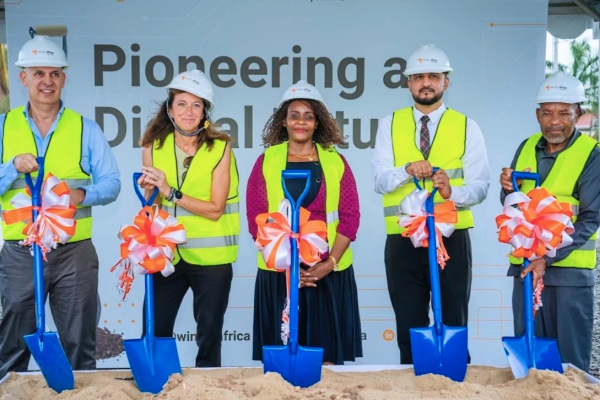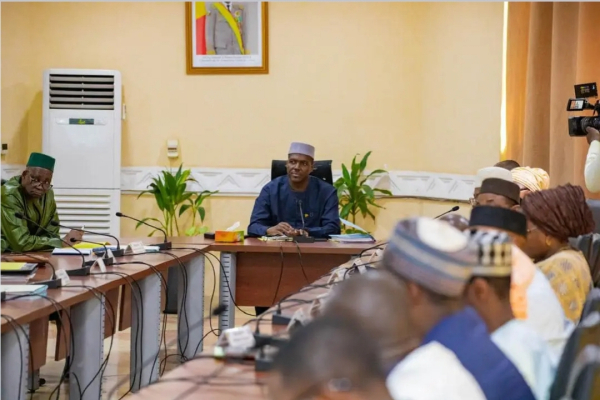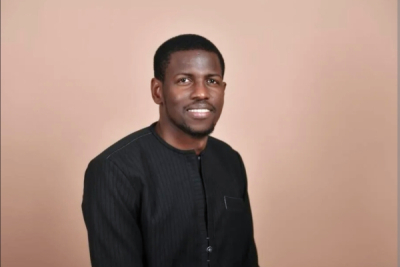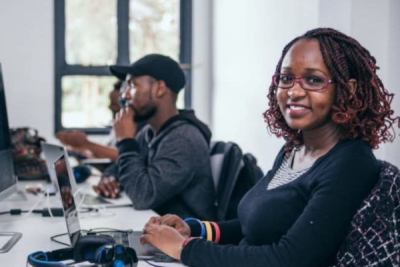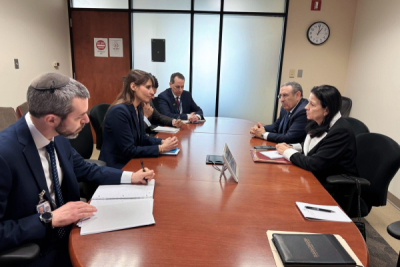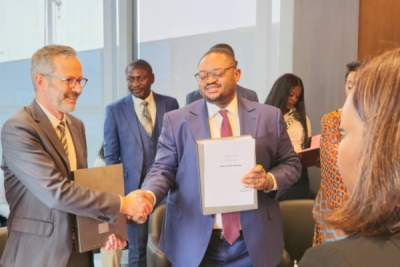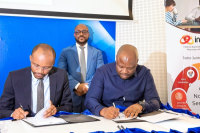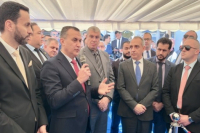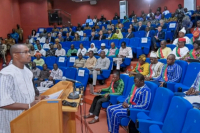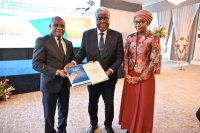
Tech (1153)
- This marks the second phase of its data center expansion
- The first phase was completed in 2022 with the construction of a Tier 3 data center
Pan-African data center operator Wingu Group announced the second phase of its Dar es Salaam data center expansion on Tuesday, March 18, aiming to better serve its clients' evolving needs.
Wingu's existing Tanzanian data center, certified Tier 3 by the Uptime Institute, ensures uninterrupted maintenance through redundant equipment and circuits. Its power supply and cooling systems utilize multiple redundant paths, limiting downtime to 1.6 hours annually. The facility is carrier-neutral, accommodating all providers.
"Among the key enhancements is doubling in rack power to support energy-intensive applications with superior efficiency. The facility now offers considerably more white space to accommodate additional racks, pods, and cages, ensuring that it can readily grow to meet the increasing demands of modern digital operations," the company stated in a press release.
This expansion seeks to solidify Wingu's position in a rapidly expanding market, fueled by Tanzania's ongoing digital transformation. According to Statista, Tanzania's data center market is projected to generate $108.97 million in revenue by 2025, with an anticipated average annual growth rate of 7.54%, reaching $145.74 million by 2029.
However, Wingu faces competition in Tanzania's data center market. Raxio Group is currently constructing a carrier-neutral Tier 3 data center in Dar es Salaam. Additionally, IT services provider Oman Data Park has signed a memorandum of understanding to build a data center in Zanzibar.
By Isaac K. Kassouwi,
Editing by Sèna D. B. de Sodji
The Malian government is prioritizing digital technology to boost national economic growth. A core component of this strategy is the digitization of public services.
Malian Prime Minister Abdoulaye Maïga launched two digital platforms designed to enhance public service delivery to citizens on Tuesday, March 18. The platforms, "Trésor Pay" and the Land Information System/One-Stop Land Office (SIF/GUF), mark a step in Mali's digitalization efforts.
"Trésor Pay," a collaboration with all Malian mobile money operators, streamlines and secures payments for services including national identity card and passport fees, traffic violations, and fixed fines. Developed by the Support Unit for the Computerization of Tax and Financial Services (CAISFF) with the National Directorate of Treasury and Public Accounting, the platform is already operational at the Directorate General of Transport and the City Hall of Commune IV.
The SIF/GUF platform modernizes land and property procedures, enabling users to complete all land management operations in a single location. The system is slated for implementation across Bamako's seven districts within the year, aligning with the Government Action Program (PAG) objectives.
These platform launches reflect the Malian government's dedication to digitizing administrative services and improving citizen access to public procedures. This initiative follows the recent launch of a digital platform simplifying access to administrative, identity, and travel documents for the Malian diaspora.
Mali has risen 13 places to 141st out of 193 countries in the 2024 United Nations e-Government Development Index (EGDI). However, challenges persist in enhancing the accessibility and efficiency of digital services. The government’s recent initiatives are expected to further improve Mali's EGDI ranking, optimize public revenue collection, and strengthen governance in the coming years.
Samira Njoya
As digital technology rapidly expands in Africa, data sovereignty is increasingly becoming a business imperative. Across the continent, innovative initiatives are emerging, offering localized solutions to ensure regulatory compliance and safeguard sensitive data.
A new cloud platform, 'Door,' developed by Cloudoor in collaboration with Groupement Orange Services (GOS), is set to launch in West Africa, offering a locally developed alternative to existing foreign cloud infrastructure. The platform aims to address data security and regulatory compliance concerns within the region.
"This initiative marks a decisive step toward strengthened digital sovereignty for African businesses. With this sovereign cloud offering, we are providing local economic players with the necessary tools to innovate, grow, and compete globally while maintaining full control over their data," said Aliou Ba, CEO of Cloudoor.
The innovation arrives as data protection becomes a strategic priority for African businesses and governments. PricewaterhouseCoopers' (PwC) "Africa Cloud Business Survey 2023 – Unlocking the Transformational Power of Cloud in Africa" identifies obstacles to cloud adoption, including budget constraints and a lack of high-quality local providers. Despite these challenges, over 50% of African businesses have adopted cloud computing, according to the study.
Cloudoor and GOS designed Door to address these challenges by making data storage more affordable and accessible. The platform utilizes the Tiers III data center infrastructure of GOS, a key component of Orange's African data center network. This data center, built in Grand-Bassam, Côte d'Ivoire, in 2016, spans 16,600 square meters. Door will officially launch in Abidjan on April 24 and in Dakar on April 29, marking a milestone in strengthening digital sovereignty in Africa.
In addition to secure data hosting, Door offers services aimed at accelerating innovation and modernizing African businesses' information systems. The platform includes a managed DevOps offering to optimize development processes and reduce time-to-market, enabling companies to address technological challenges. Door Deploy, a complementary solution, simplifies the deployment of applications, databases, and artificial intelligence (AI) models on GPU servers.
By Samira Njoya,
Editing by Sèna D. B. de Sodji
Africa's digital sector faces a critical labor shortage, threatening the continent's development. Addressing this gap within the next five years is crucial for reducing youth unemployment and boosting economic growth.
Africa's rapid digital transformation, fueled by its tech-savvy youth and innovative local solutions, is creating a surge in demand for specific tech skills. While projections indicate Africa's internet economy could reach $712 billion by 2050, as Google and the IFC highlight, realizing this potential requires a highly skilled local workforce. However, a significant skills gap persists, posing a challenge as digital expertise becomes increasingly crucial across all sectors by 2030.
Software and Application Development
The rise of startups and digital platforms, coupled with businesses embracing digital technologies, is driving demand for developers in Africa. They are essential for building mobile applications, management software, and tailored solutions for industries like healthcare and finance. Google's 2022 "Africa Developer Ecosystem" report showed a 3.8% increase in professional developers, and the COVID-19 pandemic amplified this trend, creating significant opportunities.
Cybersecurity
Trust is fundamental to a digital economy, and that trust hinges on secure electronic systems for communication, payments, and work. Interpol's "African Cyberthreat Assessment Report 2024 Outlook" reveals a continuing rise in cybercrime across Africa. In 2023, organizations in Africa experienced a 23% year-over-year increase in weekly cyberattacks, the highest rate worldwide. Cybersecurity firm Kaspersky points out that this expanding threat landscape, further complicated by artificial intelligence, is creating growing job opportunities for young Africans in diverse cybersecurity specializations.
Artificial Intelligence
The increasing adoption of AI is transforming key sectors in Africa, including agriculture, healthcare, and finance, generating a growing demand for experts in algorithm and intelligent system design. Numerous African countries have launched AI strategies since 2023, with Rwanda and Kenya leading the way in integrating AI into public services. The rise in training programs across the continent reflects the anticipated socio-economic benefits of AI, a view supported by the African Development Bank (AfDB). Importantly, AI's impact will extend beyond engineering, creating new opportunities in creative fields such as graphic design.
Data Science
Data is the new currency of the digital age. As more young Africans engage with the internet, networks, and digital services, vast amounts of data are generated daily, attracting the attention of businesses and governments. BearingPoint forecasts Africa's big data sector to generate $10 billion in direct revenue by 2030, a significant leap from 2019. To achieve this growth, specialists are needed to analyze and interpret data, providing actionable insights for various sectors, including marketing, commerce, and national security. This demand will also create new professional avenues, notably data protection lawyers.
User experience and user interface (UX/UI)
Digital applications and platforms thrive on positive user experience. UX/UI designers, who develop intuitive and engaging interfaces, are essential for ensuring user satisfaction. Market intelligence firm Mordor Intelligence forecasts the global UX/UI market to grow significantly, from $2.2 billion in 2025 to $9.28 billion by 2030. Although Africa's demand may be less pronounced than in other regions due to its evolving digital landscape, it remains a promising market for UX/UI designers.
E-commerce
Africa's e-commerce sector is experiencing rapid growth, with competition increasing annually. Both local businesses and international giants such as Jumia, Takealot, Temu, and Alibaba are investing heavily to expand their reach. Beyond online retail, related professions in platform management, logistics, and digital marketing are also developing. Organizations like MasterCard, the WTO, and UNCTAD are actively working to build and strengthen this ecosystem. TechCabal Insights predicts Africa's e-commerce market will surge from $55 billion in 2024 to $112.73 billion by 2029, representing a 105% increase over five years.
Blockchain and fintech
Blockchain and financial technologies are revolutionizing banking services and transaction security. Since the COVID-19 pandemic, major African banks have accelerated the digitization of their financial services to improve security, convenience, and competitiveness against the growing number of fintech startups. Over the past decade, fintech has been a leading driver of startup creation and investment in Africa. In 2024 alone, fintech startups secured $1.034 billion, representing 47% of the continent's total tech investment, up from 42% in 2023. As financial inclusion initiatives expand, the demand for skilled professionals in this sector is expected to increase significantly.
Cloud computing
Cloud computing adoption is rapidly accelerating across Africa, according to McKinsey. Companies in banking, telecommunications, and oil are increasingly leveraging the cloud to optimize IT costs and reduce operational expenses. This trend has fueled substantial investments in cloud infrastructure, with global players like Amazon, Google, and Oracle expanding alongside local firms such as Africa Data Centres. PwC reports that 12% of African businesses have fully migrated to the cloud, while 38% have integrated it into most operations. An additional 32% have begun migrating select processes, and 19% are exploring cloud solutions. However, PwC cautions that skills shortages are hindering faster adoption. The cloud computing sector requires a diverse workforce to realize its projected growth, with 6W Research forecasting revenues to rise from $20 billion in 2025 to nearly $45 billion by 2031.
Digital Marketing
With Africa boasting over 400 million active social media users, as reported in the Digital Report 2025, the demand for digital marketing professionals is set to rise significantly. These specialists are crucial for effective online campaigns, making social media a vital commercial space for brands and advertising agencies. Recognizing the sector's growth in employment and revenue, some governments are exploring taxation measures. For instance, in late 2023, Kenyan authorities announced a 15% tax on content creators and influencers.
Digital Energy and Green Solutions
The shift towards renewable energy and digital energy management solutions is a key priority for many development organizations, including the French Development Agency (AFD). The increasing frequency of hackathons focused on these topics underscores the growing need for specialized talent in this area. The International Energy Agency (IEA) also emphasizes the critical role of these technologies in modernizing energy infrastructure worldwide, particularly in Africa.
These emerging digital fields represent significant opportunities for Africa's youth, who constitute 60% of the population. The World Economic Forum's "Future of Jobs 2025" report underscores the growing importance of tech skills, particularly in AI and big data, alongside creative thinking and socio-emotional skills.
To capitalize on these opportunities, investment in education and training is essential. Collaboration between governments, businesses, and educational institutions is crucial to prepare Africa's future workforce.
Muriel EDJO
Artificial intelligence (AI) is reshaping economies and societies, transforming public services, industry, and innovation, among other sectors. By investing in this technology, Morocco aims to strengthen its competitiveness and digital sovereignty.
Moroccan and U.S. officials discussed deepening collaboration in digital technology and artificial intelligence (AI) during meetings in Washington on Monday, March 17, as part of efforts to accelerate Morocco's tech ambitions.
Amal El Fallah Seghrouchni, Morocco's Minister Delegate for Digital Transition and Administrative Reform, met with Steve Lang, the U.S. Ambassador-at-Large for Cyberspace and Digital Policy, and Leila Elmergawi, Director of Global AI Strategy and Policy at the U.S. State Department. The discussions focused on Morocco’s AI roadmap and the Morocco Digital Plan 2030, reinforcing a shared commitment to digital innovation.
"We reaffirmed the strong Morocco-US partnership, advancing cooperation in digital transformation and artificial intelligence to foster innovation and shared prosperity for both our nations," said Youssef Amrani, Morocco’s Ambassador to the United States.
This strategic alliance supports Morocco's "Digital Morocco 2030" initiative, designed to establish the nation as a premier African technology hub. AI is pivotal in this vision, particularly for modernizing public services. Morocco intends to deploy AI-driven solutions to automate administrative processes, analyze data, and enhance service delivery, aiming to leap from 90th to 50th place in the United Nations Online Services Index by 2030.
The United States, according to the Stanford Institute for Human-Centered AI (HAI) AI Index, stands as the global leader in AI, excelling in research, development, and economic impact. Notably, U.S. private sector AI investment ($67.2 billion) dwarfs China's ($7.8 billion), and the U.S. produces significantly more machine learning models (61 vs. 15).
Morocco's strategy leverages this U.S. expertise to expedite its digital transformation and boost its international competitiveness. Enhanced cooperation could unlock access to cutting-edge technologies, bolster digital infrastructure, and attract crucial AI-sector investments. Through strategic knowledge transfer, Morocco also seeks to cultivate its research and innovation capabilities, nurturing a dynamic and competitive domestic AI ecosystem.
By Samira Njoya,
Editing by Sèna D. B. de Sodji
To bridge Africa's digital divide, investment in infrastructure and connectivity is crucial, offering an opportunity to enhance economic inclusion in remote regions.
The Democratic Republic of Congo (DRC) secured $500 million to improve internet access for 30 million citizens, addressing structural challenges in its digital sector.
The project, co-financed by the French Development Agency (AFD) and the World Bank, aims to expand connectivity nationwide and make internet access more affordable by reducing costs and improving network coverage, particularly in underserved areas.
The agreement was signed on Friday, March 14, by DRC Finance Minister Doudou Fwamba Likunde Li-Botayi and French Ambassador to the DRC Rémi Maréchaux.
The DRC's digital sector faces challenges including uneven network coverage, limited internet access, and inadequate infrastructure, hindering economic development and digital inclusion. As of June 30, 2024, the DRC had 59.7 million mobile phone subscribers and 30.7 million mobile internet subscribers out of an estimated population of 95.2 million, according to official figures.
According to the GSM Association (GSMA), 40 million Congolese lack mobile internet access. Meanwhile, the International Telecommunication Union (ITU) reports 3G coverage reaches 55% of the population, while 2G coverage stands at 45%.
Part of the $500 million funding will be allocated to modernize Boma, a city heavily impacted by an economic crisis due to a slowdown in port activities.
The agreement is part of broader efforts to modernize the digital sector and democratize technology access. By strengthening digital infrastructure, the initiative aims to address accessibility and connectivity challenges, paving the way for new economic and social opportunities.
By Samira Njoya,
Editing by Sèna D. B. de Sodji
In Africa, digital transformation is accelerating the rise of innovative startups that leverage technology to meet the needs of local populations. However, these young companies face several challenges.
Angola's National Institute for the Support of Small and Medium-Sized Enterprises (INAPEM) and the National Institute for the Promotion of the Information Society (INFOSI) signed a memorandum of understanding on Friday, March 14, to support startup development.
The agreement aims to establish a collaborative framework to bolster INFOSI's DIGITAL.AO incubation program, with both agencies committing to joint actions to assist Angolan startups and digital entrepreneurs, fostering innovation. INAPEM will provide institutional and technical support to DIGITAL.AO.
"The objectives of the partnership include identifying and selecting startups and entrepreneurs participating in the program, providing physical incubation spaces, organizing training sessions and capacity-building workshops, offering mentorship and specialized consulting services, and facilitating access to investor networks and potential partners," INAPEM said in a statement.
An International Finance Corporation (IFC) "Assessment of the Angolan Startup Ecosystem," published in November 2023, found the ecosystem is in its nascent stage, characterized by a low number of startups, approximately 125, and resource limitations. The IFC noted no Angolan startup has yet achieved an exit event.
The IFC believes supporting startups, innovation, and entrepreneurship can diversify Angola's oil-dependent economy and create jobs, particularly for youth and women.
However, the IFC recommends Angolan authorities prioritize a startup law to improve the policy environment for young enterprises across multiple areas. This includes strengthening early-stage financing by direct government involvement in creating, investing in, and maintaining startup funding mechanisms. The financial institution also emphasizes integrating entrepreneurship, digital skills, and coding into the national education system, and establishing more vocational training schools to enhance the talent pool.
By Isaac K. Kassouwi,
Editing by Sèna D. B. de Sodji
Algeria plans for artificial intelligence to contribute 7% to its GDP by 2027, with investments in advanced infrastructure driving this goal.
Minister of Post and Telecommunications Sid Ali Zerrouki laid the foundation stone Sunday, March 16, for Algeria’s inaugural high-performance computing center dedicated to artificial intelligence in Oran. This infrastructure, deemed a strategic move toward digital sovereignty, aims to provide the country with the intensive computing capacity essential for AI technology development.
During his address, the minister said the center aligns with President Abdelmadjid Tebboune’s vision to position Algeria as a leading player in innovation and digital technology across Africa. He highlighted the opportunities this infrastructure will offer researchers, startups, and academic institutions by granting access to advanced technological resources. Equipped with latest-generation graphics processing units (GPUs), the center will provide the necessary power for developing strategic applications in fields such as healthcare, industry, cybersecurity, and smart cities.
This project is part of the recently unveiled national AI strategy, which focuses on several key areas, including strengthening computing infrastructure with data centers and optimized cloud solutions, developing education and research in collaboration with universities and specialized centers, and promoting industrial applications to support startups and businesses in designing AI-based solutions.
With this center, Algeria takes a significant step toward technological autonomy. High-performance computing plays a vital role in optimizing AI models and simulating complex systems in critical sectors such as precision agriculture, energy resource management, and climate modeling. By providing direct access to these advanced computing capabilities, the country reduces its reliance on foreign infrastructure and lowers outsourcing costs. This project contributes to strengthening Algeria’s technological independence while fostering innovation in strategic sectors.
Upon completion, this center is expected to enhance Algeria’s high-performance computing capabilities and accelerate the development of AI applications in key sectors such as precision agriculture, energy resource management, and climate modeling. It will offer local researchers and businesses the opportunity to access advanced technological resources, thereby reducing dependence on foreign infrastructure. This initiative could play a key role in the emergence of a dynamic and competitive AI ecosystem in North Africa.
By Samira Njoya,
Editing by Sèna D. B. de Sodji
Like many African countries, the Burkinabe government views digital technology as a key driver of socio-economic development. It is focusing on connecting public administrations to improve services for citizens.
The Burkinabe government has invested over 18 billion CFA francs ($30 million) in developing digital infrastructure, Prime Minister Rimtalba Jean Emmanuel Ouédraogo told the Transitional Legislative Assembly on Friday, March 14, citing significant progress in the telecommunications sector.
Ouédraogo said the state allocated more than 3 billion CFA francs to assist operators in restoring networks in areas previously destabilized by insecurity. This funding enabled the expansion of electronic communication networks to 44 new localities in underserved regions, improving internet and telecommunications service access.
On the administrative front, 104 new buildings were connected to the National Public Administration Information Network (RESINA), bringing the total number of interconnected public buildings to 2,947. To bolster digital sovereignty and strengthen national capacity, the government initiated the construction of two mini data centers, representing an investment exceeding 15 billion CFA francs.
Between 2023 and 2024, 169 administrative procedure platforms were digitized, with 77 currently operational and 92 in the deployment phase. These efforts are part of a broader strategy to position Burkina Faso as a key player in information and communication technology (ICT) integration in West Africa.
Despite these advances, Burkina Faso faces substantial challenges. According to the International Telecommunication Union’s (ITU) “Measuring Digital Development – ICT Development Index 2024,” published in June 2024, Burkina Faso ranks 43rd out of 47 African countries in ICT development, with a score of 30.1 out of 100.
Upon completion, these investments will significantly enhance Burkina Faso’s access to digital services and strengthen its technological autonomy. This, officials say, will establish a foundation for a more efficient and inclusive digital ecosystem, aligning with the nation’s modernization and socio-economic development goals.
By Samira Njoya,
Editing by Sèna D. B. de Sodji
AI presents Africa with a major opportunity to overcome its development challenges through innovative solutions. Countries like Côte d'Ivoire, among the most forward-thinking, are implementing strategic initiatives to leverage this emerging technology.
Côte d'Ivoire presented its national strategy for artificial intelligence (AI) and data governance on Thursday, March 13. After eight months of preparation, the document was officially handed over to Prime Minister Beugré Mambé (photo, center) for government adoption and its upcoming launch. This initiative marks a turning point in the country’s digital policy.
"This launch marks an important milestone in our dynamic and conscientious approach to Côte d’Ivoire’s digital transformation in the era of the Fourth Industrial Revolution, characterized by emerging technologies such as artificial intelligence," said Robert Beugré Mambé.
Fundamental Pillars and an Ambitious Five-Year Action Plan
Côte d'Ivoire’s National Artificial Intelligence Strategy is built on three fundamental pillars. The first focuses on investment in skills and infrastructure, particularly through the construction of data centers and sovereign cloud systems to host and secure local data. The second pillar is regional and social inclusion, ensuring that all cities and social groups benefit from digital transformation. The third pillar addresses governance, aiming to establish a legal and ethical framework for AI development to ensure optimal and responsible growth conditions.
The implementation of the National AI Strategy will span five years. Among the initial actions is the creation of a National Committee for AI and Data Governance, tasked with overseeing concrete projects to assess AI’s impact on key sectors such as agriculture, health, and education. Another major initiative is the establishment of an AI hub, which will include a startup incubator and a specialized training center.
A key element of this strategy is the introduction of a "Safe AI" label, designed to establish a legal and ethical framework for AI solutions in Côte d'Ivoire. Additionally, a mapping of AI resources in the country, covering both infrastructure and expertise, will be developed to monitor sectoral progress.
Data Governance: A Complementary Pillar
Data governance is an essential complementary component of the strategy, with a focus on several key areas, including data culture, ethics, security, and system interoperability. The creation of data centers and the strengthening of national connectivity are central to this strategy, ensuring effective and secure data management. The objective is to enhance the value of data while guaranteeing a secure framework for its use.
Through this dual strategy, Côte d'Ivoire aims to become a model for inclusive, ethical, and responsible AI, accelerating its digital transformation to build a united and prosperous nation by 2030. Although the investment amount required for implementation has not yet been disclosed, it is clear that the country is committed to investing in this emerging technology to drive development.
Once implemented, Côte d'Ivoire will join the select group of African countries that have launched a national AI strategy, including Benin, Egypt, and Morocco, as well as other nations such as Rwanda, Senegal, and Nigeria, which have already announced preparations for AI adoption.
By Samira Njoya,
Editing by Sèna D. B. de Sodji
More...
The Republic of Congo is working to create a more digitally advanced society. This requires modernizing essential sectors, particularly telecommunications. To this end, the country is strengthening partnerships to gain access to advanced technologies and expertise.
Congo's Minister of Posts, Telecommunications, and the Digital Economy, Léon Juste Ibombo, met with Turkish Ambassador to Congo, Hilmi Ege Türemen, on Thursday to explore expanded cooperation in postal services, telecommunications, and the digital economy.
"We discussed ways of cooperation in the postal sector, where an agreement is already under negotiation. Turkey has quickly adapted to these negotiations to finalize this agreement within a very short timeframe. Cooperation with Turkey represents a major opportunity for our country to access cutting-edge expertise and technologies in the digital sector," Ibombo said following the meeting.
The meeting is part of ongoing efforts to strengthen bilateral relations between the two countries, following recent exchanges between Congolese President Denis Sassou N'Guesso and Turkish President Recep Tayyip Erdoğan.
Both nations agreed to focus future collaboration on modernizing the postal sector, enhancing technical and human capacities, and cooperating on emerging technologies. The Turkish ambassador also expressed his country's interest in hosting Congolese trainees in the telecommunications sector and facilitating technology transfer.
If the two countries finalize agreements, they are expected to accelerate Congo's digital transformation by improving access to modern infrastructure and technological solutions tailored to the country's challenges.
Turkey, which has made significant advancements in the digital sector, has heavily invested in e-commerce and postal service development.
In 2022, online transactions in Turkey reached approximately 800 billion Turkish lira ($21.86 billion), a 488% increase compared to 2019. This growth is attributed to high internet penetration. According to Datareportal, at the beginning of this year, 88.3% of Turkey's population used the internet, while 92.1% were connected via mobile devices.
Turkey ranks 27th globally in digital governance, according to the United Nations index, with a score of 0.8913 out of 1, reflecting advanced e-government services. The country also possesses expertise in cybersecurity and artificial intelligence, fields in which it is prepared to share knowledge with Congo.
Samira Njoya
Agriculture is a cornerstone of Senegal's economy and a primary source of income for much of the rural population. To tackle issues of efficiency and transparency in agricultural subsidy management, the country is implementing digital solutions.
Senegal's government is partnering with the International Finance Corporation (IFC), the World Bank's private sector arm, to digitize agricultural subsidies, the organizations announced Tuesday.
The initiative, led by the Ministry of Agriculture, Food Sovereignty, and Livestock, aims to improve transparency and efficiency in distributing aid to key sectors, including peanuts, maize, cowpeas, and rice.
The project, approved July 29 with a budget of $500,000, will leverage IFC's technical assistance to design and implement a digitization plan, working alongside the ministry and its partners. The goal is to better structure the distribution of agricultural inputs, ensuring more efficient and transparent subsidy management.
Digitizing payments is seen as crucial to ensuring rapid and traceable subsidy distribution, providing direct support to farmers and boosting productivity in strategic sectors, officials said. This aligns with Senegal's food sovereignty objectives.
In Africa, small-scale farmers produce more than 70% of the food supply and support millions of rural households, according to the African Development Bank. However, these farmers face significant challenges, including limited access to affordable inputs, insufficient financing, scarce advisory services, and market information gaps.
The digitization initiative is expected to transform Senegal's agricultural sector, facilitating the swift distribution of subsidies in line with crop calendars and improving the livelihoods of smallholder farmers.
By Samira Njoya,
Editing by Sèna D. B. de Sodji
As Africa enters the digital era, its skilled workforce in this field remains limited across several segments. While various public initiatives aim to address this issue, they often face budgetary constraints, creating an opportunity for the private sector.
Congolese authorities received Thione Niang, a Senegalese artificial intelligence expert and promoter of the Give1Project digital skills training program, on Monday, March 10, as part of a delegation led by Adama-Dian Barri, United Nations Development Programme (UNDP) Resident Representative in Congo.
The visit aimed to integrate Congo into the Give1Project, which seeks to train 25,000 young Africans in digital skills, particularly cybersecurity and artificial intelligence. The initiative is supported by the UNDP, Microsoft, and France, among others.
"Increasingly, the world will be connected, and more and more, we will move towards digitalization," said Léon Juste Ibombo, Congo’s Minister of Posts, Telecommunications, and the Digital Economy. "Administrative procedures will be simplified. The state will benefit from optimized resources since we will no longer use the means we had before, and this is an extraordinary advancement. We need to strengthen capacities and train young people so they can take ownership of these digital infrastructures."
The initiative aligns with Congo’s national digital transformation strategy, Vision Congo Digital 2025, and the World Bank-funded $100 million digital transformation acceleration project. Local authorities aim to enhance the population's digital skills, and the Give1Project supports this objective. The African Center for Research in Artificial Intelligence (CARIA) will be part of the collaboration.
According to the United Nations, Congo had a Human Capital Index (HCI) score of 0.4637 out of 1 in 2024, a component of the e-Government Development Index. This indicator assesses citizens’ ability to use e-government services. Congo’s score is slightly above the African average of 0.4346 but below the global average of 0.6494.
By Adoni Conrad Quenum,
Editing by Feriol Bewa
The startup ecosystem is rapidly expanding worldwide. In Côte d'Ivoire, the government aims to leverage this momentum to foster the emergence of innovative startups and strengthen the digital economy.
The Ivorian government announced the creation of a Digital Startup Labeling Committee under the Ministry of Digital Transition and Digitalization, aiming to support young tech companies and strengthen the country's digital ecosystem, during the Council of Ministers on Wednesday, March 12.
According to a ministry statement, the Labeling Committee will evaluate and award a label to digital startups based on criteria including innovation, economic viability, and impact on the local economy. The committee will also oversee a digital platform to facilitate startups' access to services and support programs.
Labeled companies will be monitored and audited to ensure compliance with the label’s requirements. Additionally, the committee will propose regulatory adjustments to align the legal framework with sector advancements.
The committee is part of the Ivorian government's broader efforts to promote digital startups. According to Partech Africa, Ivorian startups raised $17 million in 2021, $33 million in 2022, $21 million in 2023, and $33 million in 2024. Despite this growth, startups face challenges including limited access to structured financing, market entry difficulties, and the lack of a clear regulatory framework.
By providing Ivorian startups with greater visibility and a structured environment, the initiative is expected to enhance their competitiveness. The long-term goal is to develop a robust digital economy that creates jobs and generates added value for Côte d'Ivoire.
By Samira Njoya,
Editing by Sèna D. B. de Sodji


